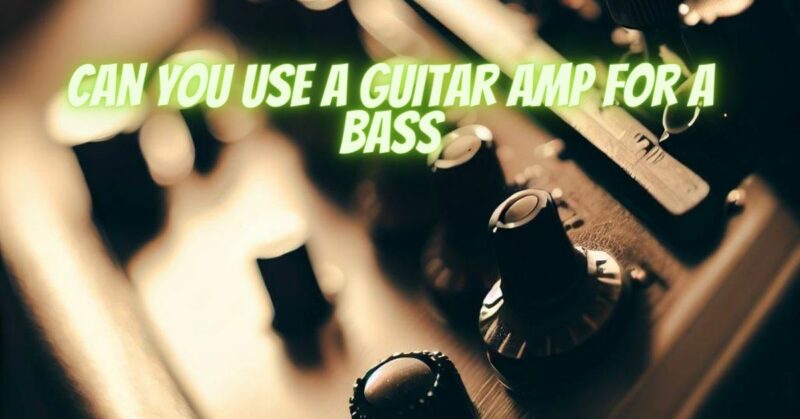Guitar amplifiers and bass amplifiers serve distinct purposes in amplifying the sound of their respective instruments. While it’s tempting to use a guitar amp for a bass or vice versa, doing so raises questions about compatibility, sound quality, and potential risks. In this article, we’ll explore whether you can use a guitar amp for a bass, the implications of doing so, and alternative solutions for amplifying your bass guitar effectively.
Understanding Amplifier Differences
Frequency Response:
- Guitar amplifiers are optimized to reproduce the frequency range of a guitar, typically ranging from approximately 82 Hz (low E on a standard guitar) to around 6 kHz or higher.
- Bass amplifiers, on the other hand, are designed to handle the lower frequencies of a bass guitar, typically extending from 41 Hz (low E on a bass) to around 500 Hz or lower.
Speaker Size and Design:
- Guitar amplifiers often feature smaller speakers with cone sizes ranging from 6 inches to 12 inches, optimized for midrange clarity and articulation.
- Bass amplifiers typically utilize larger speakers with cone sizes of 10 inches to 15 inches, capable of reproducing the extended low frequencies of a bass guitar with sufficient volume and clarity.
Power Handling and Output:
- Bass amplifiers generally provide higher wattage and power handling capabilities compared to guitar amplifiers to accommodate the increased demands of low-frequency reproduction.
- Guitar amplifiers may not be equipped to handle the power requirements of a bass guitar, leading to potential damage to the amplifier components, particularly the speaker and output transformer.
Risks of Using a Guitar Amp for a Bass
Speaker Damage:
- Bass frequencies place greater stress on amplifier components, particularly the speaker cone and voice coil. Using a guitar amp for a bass can overload and damage the speaker, resulting in distortion, loss of clarity, or even speaker failure.
Transformer Saturation:
- Bass frequencies can cause the output transformer in a guitar amp to saturate or distort, leading to a compressed or muddy sound quality.
- Excessive low-frequency content can also cause the amplifier to clip or distort, producing unwanted harmonic distortion and potentially damaging the amplifier circuitry.
Impedance Mismatch:
- Bass guitars often have a lower impedance compared to electric guitars. Plugging a bass guitar into a guitar amplifier with a higher input impedance can result in mismatched impedance, affecting the tone and signal integrity.
Alternative Solutions
Dedicated Bass Amplifier:
- The most reliable solution for amplifying a bass guitar is to use a dedicated bass amplifier designed specifically for bass frequencies.
- Bass amplifiers offer the necessary frequency response, power handling, and speaker design to reproduce the full range of bass guitar tones accurately and reliably.
Bass Preamp Pedal:
- If you prefer the tone of your guitar amplifier but require additional low-end extension for your bass guitar, consider using a bass preamp pedal.
- Bass preamp pedals are designed to shape the tone and add low-frequency enhancement to the signal before it reaches the amplifier, allowing you to achieve a bass-friendly tone without risking damage to your amplifier.
While it’s technically possible to use a guitar amp for a bass guitar in a pinch, doing so carries risks and limitations that can compromise sound quality and potentially damage your amplifier. The frequency response, power handling, and speaker design of guitar amplifiers are not optimized for bass frequencies, making them ill-suited for amplifying a bass guitar effectively. For the best results and peace of mind, invest in a dedicated bass amplifier or explore alternative solutions such as bass preamp pedals to achieve the desired tone and performance without compromising your gear.

